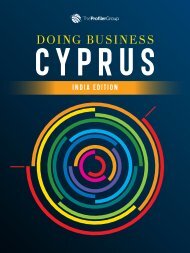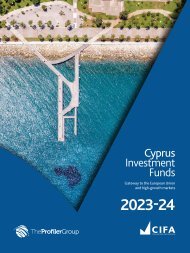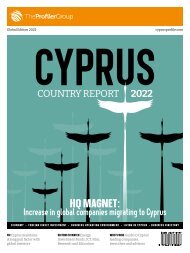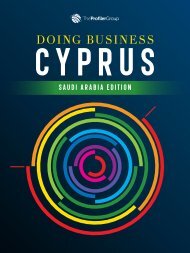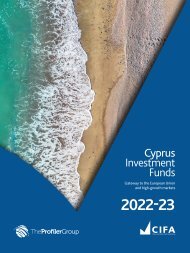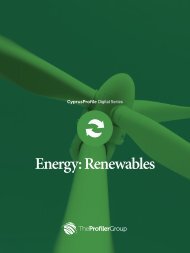2020 Cyprus Country Report
The 2020 Cyprus Country Report features in-depth articles on the economy, foreign direct investment, international trade and headquartering as well as detailed sector profiles and insights from Cyprus’ 100 most influential political, economic and business leaders shaping the future of their country and its industries.
The 2020 Cyprus Country Report features in-depth articles on the economy, foreign direct investment, international trade and headquartering as well as detailed sector profiles and insights from Cyprus’ 100 most influential political, economic and business leaders shaping the future of their country and its industries.
You also want an ePaper? Increase the reach of your titles
YUMPU automatically turns print PDFs into web optimized ePapers that Google loves.
Recovering<br />
from the<br />
impact of<br />
the Covid-19<br />
pandemic our<br />
expectations<br />
are for the intensification of our<br />
exploration and exploitation<br />
activities in the coming period.<br />
The discovery and exploitation<br />
of <strong>Cyprus</strong>’ natural gas offshore<br />
resources will be key in<br />
unlocking cleaner energy for<br />
Europe, the region and beyond.<br />
With the upcoming Cypriot<br />
offshore activities and regional<br />
projects, <strong>Cyprus</strong> will continue<br />
its growth as a safe and reliable<br />
hub for hydrocarbon activities.<br />
Demetris Fessas<br />
Acting General Manager<br />
<strong>Cyprus</strong> Hydrocarbons<br />
Company Ltd<br />
As a<br />
fundamental<br />
link in the<br />
oil supply<br />
chain in the<br />
East Med,<br />
VTTV provides logistics and<br />
storage solutions to cater<br />
for international and local<br />
customers. Given the sectors<br />
we service, the opportunities<br />
and growth are in oil ship-toship<br />
and LNG. The expectation,<br />
despite the challenging and<br />
uncertain global environment,<br />
is to explore further these<br />
sectors to offer safe, efficient<br />
and cost-effective solutions<br />
whilst also being able to<br />
provide business opportunities<br />
for our customers.<br />
George Papanastasiou<br />
General Manager and<br />
Managing Director<br />
VTTV<br />
are on the results of the next drilling campaign,<br />
expected in 2021-2022. Such a development<br />
could completely transform <strong>Cyprus</strong>’ fortunes.<br />
Currently, <strong>Cyprus</strong> is reliant on heavy fuel oil and<br />
diesel imports for its electricity needs and spends<br />
over 8% of its GDP to cover the costs. The option of<br />
an LNG plant at Vassilikos would not only tip the<br />
gas balance of the region, but would also come with<br />
major add-on benefits for <strong>Cyprus</strong> – not just profits<br />
from the sale of LNG, but advantages such as new<br />
employment, more support industries and service<br />
companies, the development of a downstream industry<br />
using cheap gas as feedstock, and low-price<br />
gas to the Electricity Authority of <strong>Cyprus</strong> (EAC)<br />
bringing electricity prices down.<br />
IMPROVING PORT FACILITIES<br />
In order to support the increase in offshore drilling<br />
activities resulting from the old and new<br />
licences, a new support base has been set up in<br />
Limassol Port to cater to the expanding needs<br />
of the international exploration companies. The<br />
government has also committed to establish a<br />
dedicated industrial port at the energy centre at<br />
Vassilikos, to become operational by 2023. The<br />
port will operate as a service centre for the oil and<br />
gas industry in <strong>Cyprus</strong> and the wider region, and<br />
it will cost around €250 million to set up.<br />
The decision to build the port was taken in<br />
response to increasing demand from oil and gas<br />
companies and those providing support services<br />
to the industry, not only in <strong>Cyprus</strong>, but also<br />
in neighbouring countries. It is an essential step<br />
to support <strong>Cyprus</strong>’ drive to become a regional<br />
centre providing support services to the Eastern<br />
Mediterranean oil and gas industry.<br />
EAST MED GAS FORUM<br />
Given the geopolitical challenges the region<br />
faces, respect of international law, and particularly<br />
the United Nations Convention on the Law<br />
of the Sea (UNCLOS), is crucial to the peaceful<br />
exploitation of hydrocarbons in the East Med.<br />
With this goal in mind, the energy ministers<br />
and representatives from Egypt, <strong>Cyprus</strong>, Greece,<br />
Israel, Italy, Jordan and the Palestinian Authority<br />
met in Cairo in January 2019 and set up the<br />
East Mediterranean Gas Forum (EMGF) – with<br />
European Commission and World Bank representatives<br />
attending the meeting as observers.<br />
The Forum is based in Cairo, with the aim<br />
to be an international organisation that respects<br />
the rights of members in regard to their natural<br />
resources in accordance with the principles of<br />
international law, and supports their efforts to<br />
benefit from their reserves and use of infrastructure.<br />
This also includes a commitment to pave the<br />
way for fruitful cooperation in the technical and<br />
economic fields, with a view to efficient exploitation<br />
of the gas potential in the region.<br />
East Med countries who agree with the<br />
Forum’s interests and objectives will have the<br />
right to join the founding members. It will be<br />
open to other countries or regional and international<br />
organisations as observers, and will<br />
work with non-members to help create dialogue,<br />
mutual understanding and mutual benefit.<br />
EMGF also underlines that the private sector has<br />
an important role to play in these efforts.<br />
EMGF could benefit regional gas development<br />
through dialogue on natural gas policies,<br />
including environmental considerations, leading<br />
to the development of a regional integrated<br />
market in a way that maximises the utilisation of<br />
gas resources and transport infrastructure in the<br />
region, and would contribute to further cooperation<br />
in the East Med.<br />
Gas export projects could also benefit from<br />
such cooperation, especially with regards to<br />
ensuring a conducive regulatory environment,<br />
putting in place the required inter-governmental<br />
arrangements and removing political risk.<br />
Natural gas could make a crucial contribution<br />
to the future of East Med countries and any<br />
such initiatives that could promote its development<br />
can only be helpful. The large gas discoveries<br />
in the East Med could also have a major impact<br />
on energy security and economic development<br />
through the exploitation of the gas regionally. This<br />
could be in power generation, but also in downstream<br />
and petrochemical projects. Given global<br />
energy developments, exploitation of natural gas<br />
resources regionally is gaining increasing importance<br />
– the Forum is well placed to facilitate this.<br />
TRANSHIPMENT TERMINAL<br />
<strong>Cyprus</strong> is fast developing into a regional fuel hub<br />
for Europe, Asia and Africa, thanks mainly to<br />
the successful operation of the sophisticated oil<br />
storage terminal by Netherlands-based global oil<br />
terminal company VTTI. The company’s €300<br />
million project in Vassilikos became operational<br />
in 2014, and was one of the biggest infrastructure<br />
projects constructed in <strong>Cyprus</strong> in recent years<br />
and put the island on the global energy map.<br />
The company uses <strong>Cyprus</strong> as a transhipment<br />
terminal, blending its raw materials and then exporting<br />
them to the rest of the world, but mainly to<br />
Lebanon and Israel. With large refineries operating<br />
and more being built in the Middle East, the<br />
international market expects more product-vessel<br />
traffic through the Suez Canal, bound for European<br />
and Mediterranean markets. These cargoes need<br />
to be resized or blended with other products to<br />
change specification and meet regional require-<br />
Sector Profile<br />
<strong>Country</strong> <strong>Report</strong> CYPRUS <strong>2020</strong> 81





